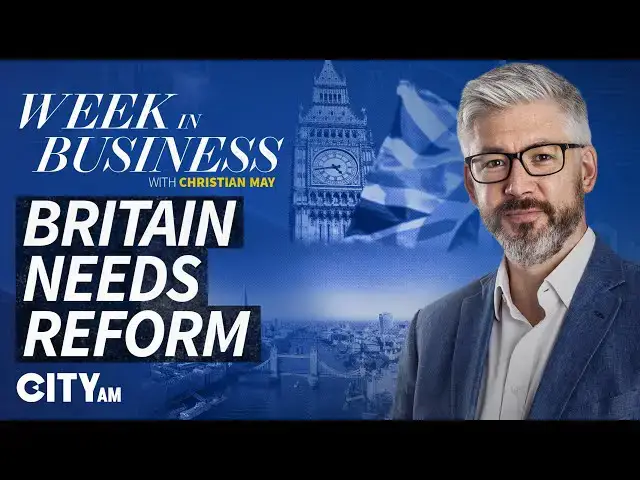Week in Business sees City AM's Editor-in-Chief, Christian May, break down the top stories of the week in the UK.
Take a look at the country’s long-term challenges - and take a look at the more immediate difficulties from growth to energy - and it’s clear Britain needs reform, says Christian May, City AM's Editor in Chief, in the latest episode of Week in Business.
But does he mean Nigel Farage or something more fundamental?
This week, Christian touches on the former Bank of England chief economist Andy Haldane's speech at the City AM Awards 2025 and why Britain needs reform.
Read more of the story here 👇
https://www.cityam.com/britain-needs-a-does-of-radical-reform/
Get more of City AM 👇
🌐 http://www.cityam.com
X(formerly Twitter): http://twitter.com/CityAM
Facebook: http://www.facebook.com/cityam
Instagram: http://www.instagram.com/city_am
LinkedIn: www.linkedin.com/company/cityam
Produced by: Christian May, Emmanuel Nwosu, Joseph Curay Teneda
Show More Show Less View Video Transcript
0:00
take a look at our country's long-term
0:01
challenges and take a look at the more
0:03
immediate difficulties from growth to
0:05
energy and it's clear Britain needs
0:07
reform but do I mean Nigel Farage or
0:11
something more fundamental welcome to
0:13
the week in business with me Christian
0:18
May right let's be clear i'm not talking
0:21
about Reform UK or Nigel Farage though
0:24
the insurgents rise in popularity isn't
0:26
hard to explain and it's certainly
0:28
related to the wider arguments I'm about
0:30
to make now I've often written and
0:32
talked about the need for some radical
0:34
thinking when it comes to our economy
0:36
but I'm a mere amateur a hobbyist when
0:38
compared with one of the biggest brains
0:40
in the country i refer to former Bank of
0:42
England chief economist Andy Haldane
0:45
haldane was one of the most senior
0:46
figures at the Bank of England for
0:48
decades serving as chief economist from
0:50
2014 to 2021 and on Tuesday night
0:53
earlier this week he addressed the city
0:55
awards at London's Guild Hall and that
0:58
speech has got people talking after the
1:01
awards which were an absolute blast by
1:03
the way I got a lot of emails from
1:04
guests saying how much they enjoyed it
1:06
or how good the food was and it was
1:08
thank you Clink Charity but most of all
1:10
I got people asking me either for a copy
1:12
of Andy Haldane's speech or to be
1:14
introduced to him nobody asked for a
1:17
copy of my speech by the way but I'll
1:19
let that slide some of the most senior
1:21
people in the city and politics
1:23
contacted me about Haldane's remarks and
1:25
I know for a fact that his observations
1:27
delivered on that night are now being
1:28
discussed at the highest levels in banks
1:30
and government departments so what did
1:33
he say well I'll give you a flavor
1:35
though you can find a full write up on
1:36
the CCM website he basically summed up
1:40
the British condition of the past 20
1:42
years as one of risk and risk aversion
1:45
shocks or nasties as he called them
1:48
including the financial crisis the Euro
1:50
crisis Brexit COVID war and Trump's
1:53
tariffs have left individuals
1:55
governments and investors hunkering down
1:57
to avoid risk now he described this as a
2:00
perfectly natural inclination but warned
2:02
that the mindset has caused terrible
2:04
damage ranging from depressed business
2:07
investment over decades to the erosion
2:09
of UK equities on the balance sheets of
2:11
UK pension funds now strikingly he drew
2:14
a parallel with the time of the Great
2:15
Depression and what economist John
2:17
Maynard Kanes called the paradox of
2:19
thrift where in Haldane's words too much
2:22
of a good thing thrift becomes a bad
2:24
thing depression the question how they
2:27
imposed to the room that night was how
2:29
we could go about breaking the cycle of
2:31
doom and gloom and a toxic relationship
2:33
between uncertainty risk aversion and
2:36
low growth a relationship that has baked
2:38
in no or low returns no or low
2:41
investment low or no growth now
2:44
different people will have different
2:45
answers to this question i understand
2:47
that often depending on their political
2:49
priorities for Haldane part of the
2:51
answer is to be found in revitalizing a
2:53
risk appetite across regulators
2:55
investors and government speaking as
2:57
someone who used to be one of the
2:59
nation's top financial regulators
3:00
Haldane called for a radical slimming of
3:03
regulations and regulators he advocated
3:05
cutting the number of regulators in half
3:08
something he said could be easily
3:09
achieved without much difficulty now as
3:11
I've talked about many times on this
3:13
show the prime minister Kharma claims to
3:15
have regulation in his crosshairs and
3:18
he's blamed a morass of regulation for
3:20
preventing billions of pounds more of
3:22
investment from flowing into the UK
3:24
economy and he has vowed to sweep away
3:26
red tape however while Haldane described
3:29
the government's approach to
3:30
deregulation as directionally right he
3:33
cautioned that words are cheap and he
3:35
called for more robust efforts to
3:37
encourage risk saying that seeking
3:39
regulatory reform via exhortation and
3:41
press release has little chance of
3:43
success he says parliament needs to
3:44
rewrite the very foundations of
3:46
regulatory law to make it clear exactly
3:48
what we want our watchd dogs to do he
3:51
also called for a more robust industrial
3:53
strategy something the government plans
3:55
to unveil shortly stimulating stuff this
3:58
I'm sure you'll agree and no wonder it's
4:00
got the city talking but there's more to
4:02
this story andy was absolutely right
4:04
that the pendulum has swung far too far
4:07
that we are risk averse but that
4:09
condition applies far beyond financial
4:11
regulation and business activity it has
4:13
infected our politics too and the truth
4:15
is we need a much more ambitious
4:17
conversation in this country about the
4:19
size of the state its functions our tax
4:21
burden what we expect from government
4:23
and what we're prepared to pay for let's
4:26
look at the context in 2010 government
4:28
spending as a proportion of GDP was 46%
4:31
having climbed steadily from a low of
4:33
35% in 1997 what became known as
4:36
austerity under David Cameron saw a
4:38
gradual decline of state expenditure
4:40
falling from 46% to about 39% by the end
4:44
of 2020 covid hits and the government
4:46
spends hundreds of billions of pounds in
4:48
its response taking state expenditure to
4:51
a peak of 53% of our entire national
4:53
output when the pandemic receded public
4:56
spending fell of course but not back to
4:58
its prepandemic level not even close by
5:00
2023 it had settled back to around 45%
5:05
we now know post spring statement that
5:07
public spending as a percentage of GDP
5:09
will still be higher in the years ahead
5:10
than at any time since 2010 and the
5:13
public sector net borrowing will still
5:14
be 8 billion pounds higher over the next
5:17
5 years than was forecast last autumn
5:19
public sector debt will also come in
5:21
around 30 billion higher by 2030 far
5:24
higher than was predicted even at the
5:26
time of the last budget that's the
5:28
immediate headache for Rachel Reeves who
5:30
is almost certainly going to blow up her
5:32
fiscal rules by the time of the next
5:33
budget in October that's a mess partly
5:36
of the government's own making but also
5:38
it stems from that 20-year approach to
5:40
our economy that Andy Haldane was
5:42
talking about the only person who tried
5:44
in recent years to have this fight was
5:46
brace yourselves Liz Truss and on paper
5:49
she wasn't far wrong but she blew it
5:51
totally partly because she was muddled
5:53
trying to spend billions on paying
5:54
everyone's energy bills at the same time
5:56
but also she got the politics dead wrong
5:59
there was no democratic consent for her
6:01
agenda and reform of this nature or
6:03
indeed reform of the opposite nature or
6:05
a different nature perhaps the left-wing
6:06
response to this crisis needs democratic
6:09
consent so who in British politics will
6:12
attempt to have this conversation it
6:14
could be reform it could be Kem
6:15
Benedok's Tory party but this is a
6:17
conversation we can either choose to
6:19
have now or we can have it when
6:20
demographics and economic reality forces
6:23
it upon us andy Haldane started this
6:25
conversation or at least part of it at
6:27
our awards on Tuesday night and it's
6:29
time others joined in well that's it
6:32
from me this week stay up tod date and
6:34
in the know with the city app and
6:36
cityam.com and I will see you next week
6:39
when perhaps we'll continue this
6:40
conversation
6:46
[Music]
#Finance
#Business News
#Politics


